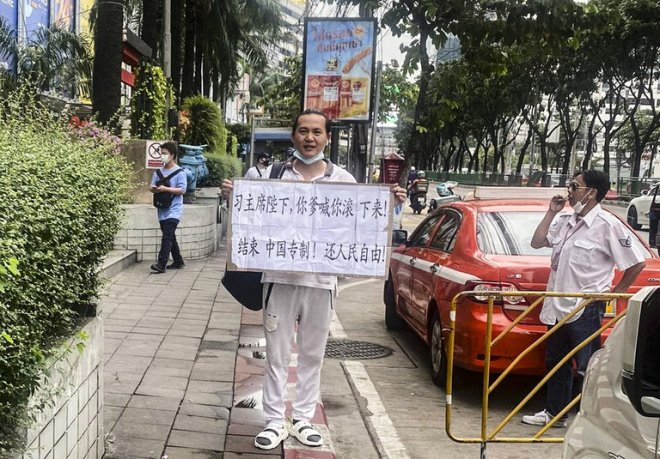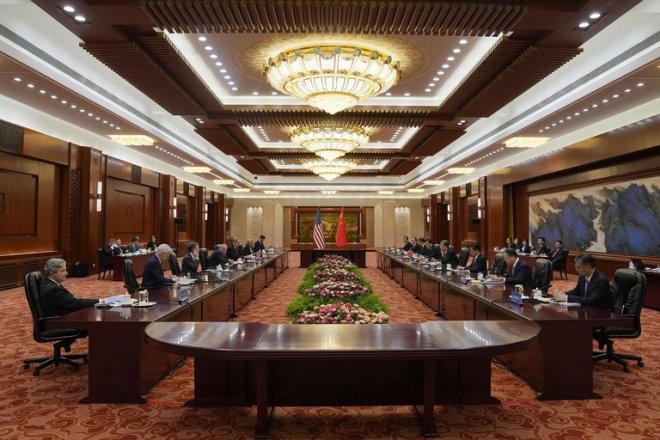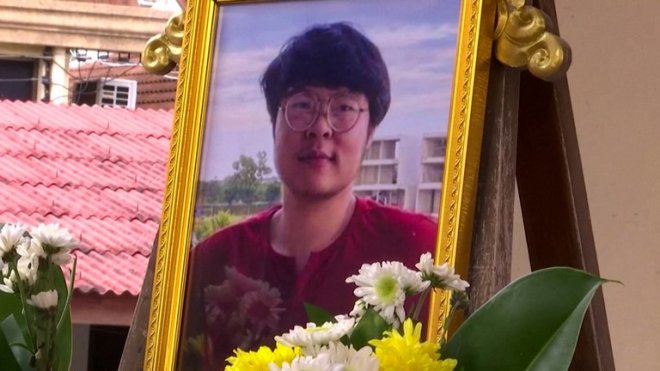Chinese activist missing from Vientiane after launching anti-censorship campaign
Concerns are growing over the fate of Laos-based Chinese free-speech activist Qiao Xinxin, whose associates say he has been incommunicado for several days amid reports of his arrest by Chinese police in the Laotian capital.Qiao, whose birth name is Yang Zewei, is missing, believed detained on or around May 31 in Vientiane, after launching an online campaign to end internet censorship in China, known as the BanGFW Movement, a reference to the Great Firewall, according to fellow activists.
The case reflects China’s growing “long-arm” repression of its critics outside the country. Some have been detained on foreign soil, while others have told Radio Free Asia they face regular harassment from people believed to be acting on Beijing"s behalf targeting loved ones back home and via their social media accounts.
According to an online petition posted by a group called the China Citizens" Action Party, activist Wang Qingpeng tweeted on June 2 that Qiao had been incommunicado for 48 hours.
A State Department spokesperson on Monday condemned threats, harassment and cross-border abductions of dissidents by the Chinese authorities, saying there were concerns for Qiao"s safety following media reports of his disappearance.
In comments made in an email to VOA Chinese on June 12, the spokesperson called on the government of Laos to respect and fulfill its obligations under international law, including not allowing the deportation of anyone who could face torture or other serious harm in their country of origin.
In an April 20 statement released via Twitter, Qiao had called on fellow activists to stage protests outside China"s embassies around the world, should he fail to post to his social media accounts for 48 hours.
In the statement that he termed a "Declaration of Not Suicide," Qiao said police in China were investigating his postings to social media and putting pressure on his loved ones back home.
"I am now in Laos, but police in my hometown are investigating my speech online and trying to harass my family members in China," said the handwritten statement, which he held up in a selfie posted to his Twitter account.
"I still love this world and [am] confident about the democracy of China," it said. "If there"s no more online updates for 48 hours, please help to protest in front of [Chinese] embassies. Thanks!"
Tearing down the wall
According to the Citizens" Action Party, Qiao launched the #BanGFW movement online in March, after which police started putting pressure on his relatives to contact him and tell him to stop.
"Qiao Xinxin didn"t back down, but fought harder and harder," petition author "Prince Ye" wrote. "He invited more netizens to raise placards calling for the Great Firewall to be torn down, to contact different governments and to get in touch with the media."
Qiao, who briefly worked as a contributor for Radio Free Asia, was visited on June 1 by two Laotian policemen and six Chinese police officers, who arrested him, according to Wang and fellow activist Lin Shengliang, who cited Qiao"s neighbor in Vientiane.
 Li Nanfei was arrested in Bangkok, Thailand, for protesting against Chinese leader Xi Jinping with a placard reading, “His Majesty President Xi, put an end to dictatorship in China! Give the people back their freedom!” Credit: Li Nanfei Twitter
Li Nanfei was arrested in Bangkok, Thailand, for protesting against Chinese leader Xi Jinping with a placard reading, “His Majesty President Xi, put an end to dictatorship in China! Give the people back their freedom!” Credit: Li Nanfei TwitterLin, who lives in the Netherlands, said Qiao had likely come back from his daily swim in the Mekong River to find the police officers waiting for him.
"It"s very likely that the people were hiding [in his apartment] and grabbed him as soon as he walked in the door," Lin said. "They likely pressed him to the floor in an instant."
"He would definitely have resisted ... but there would have been no time for him to send out any signal for help."
According to Qiao"s neighbors, he was taken away by eight uniformed police officers in handcuffs, six of whom were believed to be Chinese.
Lin said he had called the local police station to ask who had taken Qiao.
"The guy said, "It"s not our case," and was eager to wash his hands of it," Lin said. "But it was passive confirmation that he was arrested."
Transnational repression
Fellow #BanGFW activist Wang Nan said cross-border law enforcement by Chinese police is common in Laos and Thailand.
"China [is believed to have] arrested people in Thailand more than once," Wang Nan said. "As far as I know, most of Thailand"s economy and export trade depend on China, while the same is true in Laos."
Former Guangzhou police officer Deng Haiyan says he was forced to cut off all contact with his China-based family after coming to live in the United States.
"They harassed all of them – my father, even my wife"s sister and brother-in-law," Deng told Radio Free Asia in a June 12 interview. "I have basically cut off contact with them now, for fear they will be treated as guilty by association."
"They also do certain things online to target me, like posting my personal details like my ID card number and that of my wife on social media, and libeling me, saying I am part of a pornography ring," he said. "All of this is ongoing."
Harassed at home
A U.S.-based dissident who asked to remain anonymous said her family is being targeted for harassment back in China.
"My brother is harassed by them every month, and it gets worse in June, when they freeze his bank account," she said, in a reference to the politically sensitive anniversary of the 1989 Tiananmen massacre.
Meanwhile, New York-based journalist Ma Ju said he cut off contact with his family in China seven years ago.
"I have also had all kinds of online harassment on a daily basis," Ma said. "I think the Chinese Communist Party are behind it."
"I have been hacked so many times while making online content -- my power just cut out on two occasions," he said. "I contacted the FBI about it some time ago, and it turned out there had been a hacker attack that disconnected my internet."
"If I"m doing a live stream I"ll use mobile data instead, so they can"t cut me off."
In November 2022, police in Bangkok Police detained an exiled Chinese dissident after he staged a lone street protest against Chinese leader Xi Jinping inspired by the Oct. 13 "Bridge Man" protest in Beijing.
Veteran rights activist Li Nanfei, who has been stranded in Thailand for several years despite being a U.N.-registered refugee, was arrested after holding up a placard on a Bangkok street that read: "His Majesty President Xi, put an end to dictatorship in China! Give the people back their freedom!"
Earlier in the same month, Adiyaa, an ethnic Mongolian Chinese national who fled the country after his involvement in 2020 protests over a ban on Mongolian-medium teaching in schools, reported being held by Chinese state security police in Bangkok.
In 2019, Thai police detained two Chinese refugees – Jia Huajiang and Liu Xuehong – who had earlier helped jailed rights website founder Huang Qi before fleeing the country.
Thailand has sent refugees from China back home in the past.
In July 2018, authorities in the southwestern Chinese city of Chongqing jailed rights activist Dong Guangping and political cartoonist Jiang Yefei after they were sent home from Thailand as they were awaiting resettlement as political refugees, prompting an international outcry.
Translated by Luisetta Mudie. Edited by Malcolm Foster.
[圖擷取自網路,如有疑問請私訊]
|
本篇 |
不想錯過? 請追蹤FB專頁! |
| 喜歡這篇嗎?快分享吧! |
相關文章
AsianNewsCast






















